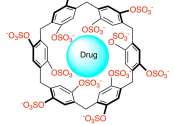Bioengineers close to brewing opioid painkillers without using opium from poppies
For centuries poppy plants have been grown to provide opium, the compound from which morphine and other important medicines such as oxycodone are derived.

For centuries poppy plants have been grown to provide opium, the compound from which morphine and other important medicines such as oxycodone are derived.
Biotechnology
Aug 24, 2014
5
0

Drug overdoses in the United States have risen sharply in the last two decades. Nearly 92,000 people died from overdoses of illegal drugs and prescription opioids in 2020—more than five times the number of deaths in the ...
Biochemistry
Dec 15, 2022
0
425

(Phys.org) -- Researchers and doctors have gleaned new clues to the molecular mechanisms behind some of the most addictive substances in the world, thanks to two new studies that uncovered the structures of some of the most ...
Biochemistry
Apr 25, 2012
0
0

Powerful opiate drugs are a mainstay in modern medicine, alleviating pain in both acute and chronic forms. These charms however, bear a curse. Users quickly develop tolerance to their effects, requiring ever-increasing doses ...
Biochemistry
Mar 2, 2015
0
612

A 15-year-old Colorado high school student and young scientist who has used artificial intelligence and created apps to tackle contaminated drinking water, cyberbullying, opioid addiction and other social problems has been ...
Other
Dec 5, 2020
2
202

In today's post-pandemic world, strained global supply chains have emerged as a new norm. But in the case of prescription opioids, namely oxycodone and hydrocodone in the early 2000s, that supply chain flowed freely without ...
Economics & Business
Jun 7, 2022
0
54

Researchers at Rutgers University have uncovered a new way to stimulate activity of immune cell opiate receptors, leading to efficient tumor cell clearance.
Biochemistry
May 11, 2012
2
0

The U.S. opioid epidemic is being driven by an unprecedented surge in deaths from fentanyl and other synthetic opiates. Fentanyl's powerful effects are long-lasting, and even tiny amounts of the drug can lead to an overdose. ...
Bio & Medicine
Mar 31, 2019
1
238

According to the Centers for Disease Control, 100,000 Americans die each year from an overdose, most due to the use of synthetic opiates like fentanyl. While naloxone, currently the only an antidote for opiate overdose, has ...
Biochemistry
Jul 18, 2023
2
45
Scientists from the Florida campus of The Scripps Research Institute (TSRI) have described a pair of drug candidates that advance the search for new treatments for pain, addiction and other disorders.
Biochemistry
Jan 13, 2014
0
0